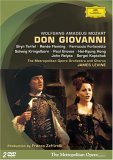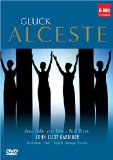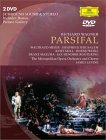 Don Giovanni - Mozart | DVD | (14/03/2005)
from £N/A
| Saving you £N/A (N/A%)
| RRP
Don Giovanni - Mozart | DVD | (14/03/2005)
from £N/A
| Saving you £N/A (N/A%)
| RRP The Opera Don Giovanni drama in two acts.
 Gluck - Alceste (Gardiner, Monteverdi Choir) | DVD | (24/11/2008)
from £N/A
| Saving you £N/A (N/A%)
| RRP
Gluck - Alceste (Gardiner, Monteverdi Choir) | DVD | (24/11/2008)
from £N/A
| Saving you £N/A (N/A%)
| RRP When the historic Theatre du Chatelet in Paris re-opened after a period of extensive refurbishment the first two productions mounted in the theatre were Gluck''s Alceste and Orph''e et Eurydice. Both operas were sung in their French versions and were mounted and designed by Robert Wilson and conducted by John Eliot Gardiner. This was the first time Wilson and Gardiner had collaborated and their individual credentials combined to produce an exceptional result. American polymath Wilson was responsible for some of the most ambitious avant-garde performance projects of the 1970s and 80s.Since the mid-1980s he has increasingly brought his prodigious creativity to works fiom the standard dramatic and operatic repertoire transforming them into his own unmistakably minimalist yet grandiose visions. His styled classical interpretations of Alceste and Orph''e bear his trademarks of an uncluttered stage and the arresting use of colour and light. They are not so much timeless as in Robert Wilson''s words ''full of time''. With their minutely rehearsed gestures at once formal and poetic the singers have the grace and elegance of Balanchine or Martha Graham dancers. A key figure in the revival of Early Music John Eliot Gardiner has long been a champion of Gluck''s French operas and is a great Gluck conductor. He received enormous critical acclaim for his musical direction of both Orph''e and Alceste at the Chatelet as did his orchestras and chorus. He sought to rid the operas of any vestiges of remoteness or venerable respectability and to release the huge emotional charge that lies behind the beauty of Gluck''s classical sobriety. The stories are after all he says not only poignant and deeply moving they have an immediate and contemporary relevance: they portray two married couples striving to protect their union and their love plumbing the very depths of their emotional strength and summoning the courage to make huge personal sacrifices. ''If presented in a way that''s immediate and with tremendous intensity and truth of expression then all the dross and superficiality of the stage action falls away and you''re left with what''s actually a very visceral connection between two living people.'' Television''s top opera director Brian Large worked closely with Robert Wilson and John Eliot Gardiner to ensure that the translation of live performance to the small screen is of the highest artistic and techcal standard. John Eliot Gardiner chose Gluck''s 1776 French version of Alceste for Robert Wilson''s production conducting the piece for the first time with his period-instrument ensemble the English Baroque Soloists. The excellent Monteverdi Choir provides the chorus and unusually they sing fiom the pit with dancers taking their place on stage. They give magnificently persuasive expression to the horror and compassion demanded by the drama. The 'Greek geometric perfection of Robert Wilson''s various tableaux is beautifully realised with his eye for striking theatrical symbol creating an intriguing visual arena for one of Gluck''s most elevated and sublime works. Soprano Anne Sofie von Otter one of the finest singers of her generation takes the title role of Alceste Queen of Thessaly who offers to die at the hands of the gods in place of her husband Admete (Paul Groves) so that the people will not lose their king. To universal astonishment she is saved from the Underworld by Hercule (Dietrich Henschel) whose action is sanctioned by Apollon (Ludovic T''zier) in a dramatic deus ex machina.
 Mozart In Turkey | DVD | (22/12/2003)
from £10.30
| Saving you £9.69 (94.08%)
| RRP
Mozart In Turkey | DVD | (22/12/2003)
from £10.30
| Saving you £9.69 (94.08%)
| RRP Mozart in Turkey is a feature-length 88-minute hybrid BBC co-production which interleaves making-of documentary footage (24 minutes) and filmed highlights (64 minutes) from Mozart's opera Die Entführung aus dem Serail ("The Abduction from the Seraglio"). Working to their pre-recorded performance of the complete opera conducted by leading Mozartian Sir Charles Mackerras with the Scottish Chamber Orchestra and Choir, we see the cast mime to playback key arias, duets and quartets from Mozart's gorgeous work. The story of a Spanish noble woman, Konstanze (soprano Yelda Kodalli), her English maid, Blonde (soprano Désirée Rancatore), fiancé, Belmonte (tenor Paul Groves) and his servant, Pedrillo (tenor Lynton Atkinson) in the Turkish Harem of Pasha Selim (Oliver Tobias in a speaking role) is beautifully filmed in the famous Topkapi Palace in Istanbul. The documentary sections offer a brief, rather superficial look at Mozart's writing of the opera and the ideas that influenced it and are expressed within the drama. The music-making is hardly to be faulted and the staging is ravishing. Unfortunately the whole seems like an over-length DVD extra that should accompany a complete film of the opera--the very thing that is mysteriously missing from this release. On the DVD Mozart in Turkey is presented anamorphically, enhanced at 16:9 for widescreen televisions, with a virtually flawless picture taken, presumably, from digital tape. If the programme is watched complete the sound is stereo only and the music sometimes sounds harsh. If music highlights are selected, sound is available in stereo or a much fuller and more rounded Dolby Digital 5.1. There are optional subtitles in English, German, Spanish, French and Dutch, but if any of these is selected it is imposed over the English-language documentary sections as well as the German-language opera scenes. When playing music highlights there are rather abrupt and unmusical fades in and out between scenes. The menu is awful, offering the option either to play all or select a given track, but not to play from a particular scene onwards. Switching subtitles on or off, or changing audio tracks, entails returning to the main menu then starting the programme afresh. There is no resume play facility and there are no extras. --Gary S Dalkin
 Wagner: Parsifal | DVD | (14/10/2002)
from £22.98
| Saving you £-0.99 (N/A%)
| RRP
Wagner: Parsifal | DVD | (14/10/2002)
from £22.98
| Saving you £-0.99 (N/A%)
| RRP A performance of Wagner's opera 'Parsifal' featuring the Metropolitan Opera Orchestra and Chorus. Conducted by James Levine. The action takes place in the Middle Ages. At the castle of Monsalvat cut off from the rest of the world the brotherhood of Grail Knights guards the chalice in which the blood of the crucified Saviour had once been caught. In an effort to seize possession of the Grail Klingsor a powerful magician has established his realm at the foot of the mountain peop
![Music Man [Blu-ray] [US Import]](/pictures/1152511.jpg) Music Man | Blu Ray | (02/02/2010)
from £N/A
| Saving you £N/A (N/A%)
| RRP
Music Man | Blu Ray | (02/02/2010)
from £N/A
| Saving you £N/A (N/A%)
| RRP ![Gluck - Alceste / Robert Wilson, John Eliot Gardiner, Théâtre du Châtelet [1999]](/pictures/1028730.jpg) Gluck - Alceste / Robert Wilson, John Eliot Gardiner, Théâtre du Châtelet | DVD | (16/09/2015)
from £14.98
| Saving you £10.01 (66.82%)
| RRP
Gluck - Alceste / Robert Wilson, John Eliot Gardiner, Théâtre du Châtelet | DVD | (16/09/2015)
from £14.98
| Saving you £10.01 (66.82%)
| RRP Rebelling against the increasingly formulaic operas of the time, Christoph Willibald Gluck's "reformist" opera Alceste (1767) was a successful attempt to return to a purer form of musical drama. It is highly appropriate that this 1999 production of the revised 1776 Paris version should be conducted by Sir John Eliot Gardiner, with the English Baroque Soloists and Monteverdi Choir, the same forces responsible for many fine Bach performances equally emphasising character and text. In setting the tragic story of the profound love between Queen Alceste and her husband King Admète, Gluck provided a score of austere, rending beauty. Principals Anne-Sofie Von Otter and Paul Groves dominate the production as much through the power of their acting as their musical prowess, the major scenes being electrifying in their emotional intensity. Contrasting with this psychological realism are the simple, Greek-inspired designs by Robert Wilson. Silhouetted geometric shapes glide gracefully through the slow-motion movements of the actors, bringing a hypnotic, dreamlike quality to the work. Near constant blue lighting adds a sense of late evening tranquillity, giving the stage a highly distinctive look and a feeling of dislocation in space and time. Both chilling and uplifting, this Alceste is a triumph. On the DVD: There are no special features other than a well-appointed booklet. The Dolby Digital 5.1 sound effectively re-creates a wide theatrical atmosphere and given the low lighting levels throughout, the anamorphically enhanced 16:9 picture makes the most of the striking imagery. The disc is encoded for regions 2 and 5. --Gary S Dalkin
![Mozart 22 - Die Zauberflote [2007]](/pictures/1067483.jpg) Mozart 22 - Die Zauberflote | DVD | (22/01/2007)
from £19.05
| Saving you £2.94 (15.43%)
| RRP
Mozart 22 - Die Zauberflote | DVD | (22/01/2007)
from £19.05
| Saving you £2.94 (15.43%)
| RRP Part of the epach-making release of Mozart's complete operas on DVD, Pierre Audi's production of this blithe fable suggests an operatic Garden of Eden, enhanced by the primary-coloured, story-book designs of Karel Appel. The tale of two young men undergoing a rite of passage to win their perfect spouse inspired Mozart's most tuneful yet sublime score - superbly brought to life by Riccardo Muti and a distinguished cast of international soloists.
![Mozart In Turkey [DVD]](/pictures/1167043.jpg) Mozart In Turkey | DVD | (22/12/2003)
from £N/A
| Saving you £N/A (N/A%)
| RRP
Mozart In Turkey | DVD | (22/12/2003)
from £N/A
| Saving you £N/A (N/A%)
| RRP ![Berlioz: La Damnation de Faust [1999]](/pictures/1028800.jpg) Berlioz: La Damnation de Faust | DVD | (15/05/2000)
from £26.98
| Saving you £-1.99 (-8.00%)
| RRP
Berlioz: La Damnation de Faust | DVD | (15/05/2000)
from £26.98
| Saving you £-1.99 (-8.00%)
| RRP This imaginative staging of Berlioz's dramatic symphony for chorus, soloists and orchestra relies heavily on the moving of massed choirs across a large stage. It has vivid lighting effects--rather too many of them using strobes--and monolithic multi-purpose sets, in particular a revolving glass drum which functions both as cinema screen and rostrum for singers, so that the final ride to Hell, for example, is sung by Mephistopheles and Faust above a cavalcade of projected horses, like the inside of a zoetrope. The three main soloists have voices on a scale that can compete with these flashy production values--White and Kasarova, in particular, sing at a level of intensity that would swamp anything less; the climactic seduction trio has rarely been sung so well or with such an overpoweringly polymorphous eroticism. Cambreling marshals his forces effectively, giving full rein to the work's showstoppers like the "Hungarian March" but not neglecting the subtler less kinetic Gluckian side of Berlioz's vocal writing. The DVD has subtitles in English, German and Dutch, and menus in those languages, as well as French, Italian, Spanish and Swedish. --Roz Kaveney
![Tan Dun: The First Emporer [2008]](/pictures/1087640.jpg) Tan Dun: The First Emporer | DVD | (15/09/2008)
from £13.21
| Saving you £2.04 (17.07%)
| RRP
Tan Dun: The First Emporer | DVD | (15/09/2008)
from £13.21
| Saving you £2.04 (17.07%)
| RRP Legendary tenor Pl''cido Domingo stars in the visually stunning opera The First Emperor by Academy Award winning composer Tan Dun (Crouching Tiger Hidden Dragon) - Filmed live at the Metropolitan Opera in High-definition. EMI Classics continues its 'Metropolitan Opera : Live in High-Definition DVD series' with the Metropolitan Opera's world-premiere of Tan Dun and Ha Jin's The First Emperor. Commissioned by the MET in the mid-1990s this spectacular new production was one of the most highly anticipated cultural events of the 2006-07 Metropolitan Opera season. The Opera tells of Emperor Qin's quest for a national anthem for his new country and his ill-fated decision to force a rebellious but talented young composer to write it. Tragedy results following the composer's love affair with the emperor's crippled daughter including the deaths of three principal characters. Pl''cido Domingo as Emperor Qin leads an all-star ensemble in this classic story ideally suited to the opera stage. The First Emperor combines the expressive power of traditional ancient Chinese singing with the long musical lines of Italian Opera. This juxtaposition of musical cultures illustrates Tan Dun's musical style and influences perfectly. In his music not only East and West but ancient and modern coexist. One of just six composers to conduct their own works at the Met Tan Dun lead all the performances of the first run of the opera. Revered Chinese filmmaker Zhang Yimou (Hero Raise the Red Lantern) directs and was instrumental in the opera's creation having worked closely with Tan Dun while he composed the music.

Please wait. Loading...
This site uses cookies.
More details in our privacy policy